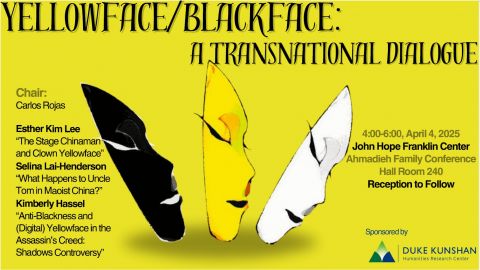Sponsor
DKU Humanities Research Center
Esther Kim Lee, “The Stage Chinaman and Clown Yellowface”
The stage Chinaman began as a theatrical archetype in British pantomime and was imported to the U.S. during the nineteenth century. The talk examines the evolution of the character type in the context of the Opium Wars and the Chinese Exclusion Act of 1882.
Esther Kim Lee is France Hill Fox Professor of Theater Studies, International Comparative Studies, and History and the Director of Asian American and Diaspora Studies at Duke University. She is the author of Made-Up Asians: Yellowface during the Exclusion Era.
Selina Lai-Henderson, “What Happens to Uncle Tom in Maoist China?”
Since Lin Shu’s Chinese translation of Uncle Tom’s Cabin left a profound impact in 1901, Harriet Beecher Stowe’s character, Tom, has continued to inspire and repel Chinese reimaginging of Afro-Asian intimacy. Widely performed in blackface by Chinese actors in 1959, Tom’s fraught journey of reappropriation through Maoist China complicates the nation’s aspiration to be a leader in global decolonization.
Selina Lai-Henderson is Associate Professor of American Literature at Duke Kunshan University, where she co-directs the Humanities Research Center. She is on the editorial board of American Quarterly, and is a Hutchins Family fellow at Harvard University.
Kimberly Hassel, “Anti-Blackness and (Digital) Yellowface in the Assassin’s Creed: Shadows Controversy”
Yasuke, a historical figure and Black African samurai, has increasingly become the subject of media representation, most recently in his casting as the protagonist of the newest installment of the Assassin’s Creed franchise. This talk examines the anti-Black rhetoric within the negative reception of the cinematic trailer for Assassin’s Creed: Shadows, focusing on the use of digital yellowface and machine translation among white male gamers to decry Yasuke’s appearance in the game and the broader collaborations between male Anglophone gamers and Japanese ethno-nationalists in opposing the game. I argue that the dynamics within this controversy, along with broader histories of blackface and anti-Blackness in Japanese popular culture, seek to “gatekeep” Japanese popular culture and ultimately exclude Blackness.
Kimberly Hassel is Assistant Professor of Japanese Studies in the Department of Asian and Middle Eastern Studies at Duke University. She is a sociocultural anthropologist and digital ethnographer specializing in digital culture, youth culture, diaspora, contemporary Japanese society, and Afro-Japanese encounters. Her work has appeared in Anthropology News, Mechademia, Who Is The Asianist? The Politics of Representation in Asian Studies, and the commentary board of Critical Asian Studies.
DKU Humanities Research Center
